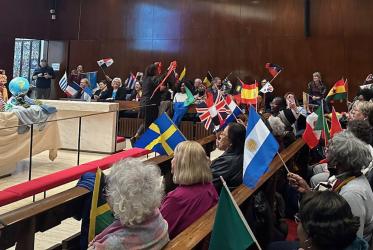“An ongoing process of learning human rights as a way of life and as relevant to peoples’ daily lives, for women and men to participate in implementing the Sustainable Development Goals (SDGs), will create a political culture of human rights that will enrich all cultures and religions to create a new future for humanity”, said Shulamith Koenig, founder of People's Movement for Human Rights Learning (PDHRE), during a brainstorming event on Human Rights and the SDGs, held in New York, on 12 May. “That’s something Nelson Mandela already called for”, added Koenig.
Co-organized by UNICEF, the World Council of Churches (WCC), the PDHRE, and EU Delegation to the United Nations in New York, the brainstorming event was designed to kick-start a longer term process of engagement at local, regional and global levels on the implementation of the SDGs, including through human rights learning. More than 50 participants from UN agencies, diplomatic missions, civil society and academia took part.
Besides Koenig, the list of speakers also included Olav Kjorven, director of public partnerships for UNICEF; Andrew Gilmour, director in the Secretary-General's Office for Political, Peacekeeping, Humanitarian and Human Rights; and Rudelmar Bueno de Faria, WCC representative to the UN.
“United for Dignity - Making SDG Progress Everybody's Business: exploring the Role of Human Rights Learning in Enabling and Empowering Local Action” had opening remarks from EU Ambassador Vale de Almeida, followed by UN Assistant Secretary General, Ivan Šimonović, who set the tone for the subsequent reflections, with key points including the pivotal role of Agenda 2030 in building a world in which the dignity of all people is known, recognized and respected; freedom from fear and want is enlarged; and extreme inequality reversed.
The panelists highlighted the need to intensify human rights learning to that end and the importance of accountability.
The "Torch of Dignity" initiative, a civil society mobilization in the loop of the 2016 Olympic Games that is currently securing support from numerous countries, received special support from the speakers for being seen as a concrete example on how to achieve a new model of cooperation in the short term and as a rallying point for human rights as a "way of life" and for addressing discrimination of all sorts.
Other important aspects highlighted in the event were the need to promote a culture of human rights learning and to hold governments accountable and the pre-eminence of human dignity, including in a religious context.
“Human dignity in sustainable communities is also the foundational purpose and objective of the SDGs”, said Bueno de Faria. “So even though there is little direct reference in the SDGs to human rights, human dignity is the principle that binds human rights and the SDGs together, and the basis on which we support and are engaged in both from the perspective of our faith commitment”, he added.
After the presentations of the panelists, participants were divided into four break-out groups to discuss lessons learned from four initiatives: human rights cities; engaging children and communities matters; and youth power: youth-led accountability to achieve the global goals and empowerment through sport and play.
Each group deliberated on the strengths and weaknesses of the initiatives, links to Agenda 2030 implementation, scaling-up potential and partnership opportunities and identified key points to follow up, such as the importance of forging partnerships, including inter-disciplinary collaboration and the need to break down "silos"; the opportunity provided by global indicators in the SDG context with a need to step up efforts to encourage "citizen-generated data" as a means of tracking progress and the potential for greater harnessing of religious organisations which had extensive reach and influence.
There was broad support among participants for harnessing the energy and readiness to do more ambitious initiatives at local, regional and global levels that could include mobilizing maximum support for the “Torch of Dignity” initiative which is designed to both draw on the human spectacle and potential of the Olympics and add a new dimension to it: that of facilitating the learning and integration of human rights around the globe.
While the epicenter of the initiative is Brazil, numerous other countries are engaging on the idea. The UN itself should be a focal point for the “Torch of Dignity” message – with a ceremony around the time of the Olympics, a possible permanent “Torch” to serve as a reminder of the power of human rights learning and the declaration of the UN as a “human rights” city for the day.
For UNICEF’s Olav Kjorven, the brainstorming event in New York was a space to start building an alternative to the current relative lack of focus and dedicated support for social mobilization.
“We need something new, something that does not yet exist at the global level, something that would make sense from the perspective of communities in terms of being useful for them”, he said. “Something that would respond to the call of Agenda 2030 to empower and involve people in realizing the SDGs; something that would sustain a global commitment to the idea of human rights as a way of life”, added Kjorven.
Many of the organizations present at the initial “United for Dignity” brainstorming talk have global reach through local offices or missions. Among the conclusions of the brainstorming conversation is that local collaboration on issues linked to human rights learning should be forged.
The need for further development of the human rights cities initiative with more cities around the globe pledging to transform themselves into catalysts for human dignity and human rights and the smart use of modern communication methods to spread the word on dignity and human rights learning - encouragement to use the hashtag #UnitedForDignity – were also raised.






